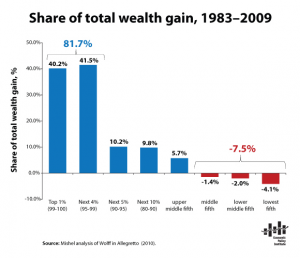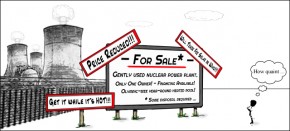
I want to highlight something from this recent New York Times article:
“Thirty years ago, when Forbes published its first Forbes 400, a net worth of $75 million would get you on the list. Today it takes $1.1 billion. In the last year alone, the cumulative net worth of the wealthiest 400 people, by Forbes’s calculation, rose by $200 billion. That compares with a 4 percent drop in median household income last year, according to the Census Bureau. One would be hard pressed to find a clearer example of how powerfully income inequality has taken root.”
Wow.
Thirty years ago, in 1982, there were (according to the Forbes 400) 13 billionaires in America. Today? 412.
Another quote, this one from the Economic Policy Institute:
. . . the richest 5 percent of households obtained roughly 82 percent of all the nation’s gains in wealth between 1983 and 2009. The bottom 60 percent of households actually had less wealth in 2009 than in 1983, meaning they did not participate at all in the growth of wealth over this period.
Here’s a slightly different way to view that statistic:
According to conservative Republicans, (and based upon everything they say on the subject), wealth redistribution is good and godly and as American as apple pie. Income redistribution, however, comes straight from hell and will condemn our country to . . . whatever.
My point? Simple.
Some things never change. Human nature is at the top of that list. This isn’t the first time that a very small group of “entitled” people have accumulated (relative to others alive at the time) vast amounts of wealth, property and power. History is bloated with examples.
And the result — no matter how long the cauldron took to come to a boil — was never pretty.
If something doesn’t change, and sooner rather than later, I’m certain the bubbles in our own cauldron will grow and grow and grow.
Jeez.






